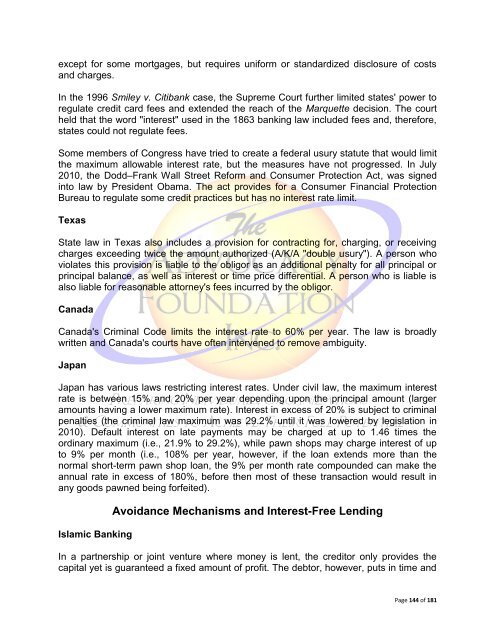You also want an ePaper? Increase the reach of your titles
YUMPU automatically turns print PDFs into web optimized ePapers that Google loves.
except for some mortgages, but requires uniform or standardized disclosure of costs<br />
and charges.<br />
In the 1996 Smiley v. Citibank case, the Supreme Court further limited states' power to<br />
regulate credit card fees and extended the reach of the Marquette decision. The court<br />
held that the word "interest" used in the 1863 banking law included fees and, therefore,<br />
states could not regulate fees.<br />
Some members of Congress have tried to create a federal usury statute that would limit<br />
the maximum allowable interest rate, but the measures have not progressed. In July<br />
2010, the Dodd–Frank Wall Street Reform and Consumer Protection Act, was signed<br />
into law by President Obama. The act provides for a Consumer Financial Protection<br />
Bureau to regulate some credit practices but has no interest rate limit.<br />
Texas<br />
State law in Texas also includes a provision for contracting for, charging, or receiving<br />
charges exceeding twice the amount authorized (A/K/A "double usury"). A person who<br />
violates this provision is liable to the obligor as an additional penalty for all principal or<br />
principal balance, as well as interest or time price differential. A person who is liable is<br />
also liable for reasonable attorney's fees incurred by the obligor.<br />
Canada<br />
Canada's Criminal Code limits the interest rate to 60% per year. The law is broadly<br />
written and Canada's courts have often intervened to remove ambiguity.<br />
Japan<br />
Japan has various laws restricting interest rates. Under civil law, the maximum interest<br />
rate is between 15% and 20% per year depending upon the principal amount (larger<br />
amounts having a lower maximum rate). Interest in excess of 20% is subject to criminal<br />
penalties (the criminal law maximum was 29.2% until it was lowered by legislation in<br />
2010). Default interest on late payments may be charged at up to 1.46 times the<br />
ordinary maximum (i.e., 21.9% to 29.2%), while pawn shops may charge interest of up<br />
to 9% per month (i.e., 108% per year, however, if the loan extends more than the<br />
normal short-term pawn shop loan, the 9% per month rate compounded can make the<br />
annual rate in excess of 180%, before then most of these transaction would result in<br />
any goods pawned being forfeited).<br />
Islamic Banking<br />
Avoidance Mechanisms and Interest-Free <strong>Lending</strong><br />
In a partnership or joint venture where money is lent, the creditor only provides the<br />
capital yet is guaranteed a fixed amount of profit. The debtor, however, puts in time and<br />
Page 144 of 181

















